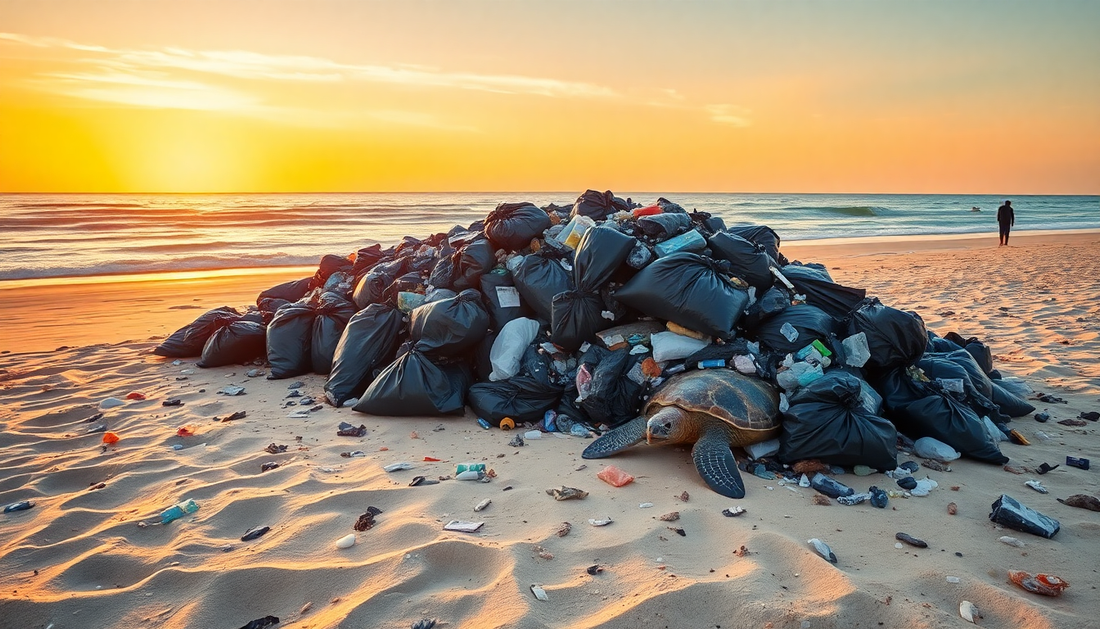In our modern world, bin bags have become an integral part of our daily lives, serving as a convenient solution for waste disposal. However, the ubiquity of these seemingly innocuous items has led to a growing environmental crisis that demands our attention. As we grapple with the mounting issue of plastic pollution, it's time to shine a spotlight on the role of bin bags and explore the actions being taken by governments worldwide to address this pressing concern.
The Environmental Impact of Bin Bags
Bin bags, primarily composed of plastic, have a significant impact on the environment. These non-biodegradable materials accumulate in landfills and oceans, contributing to the growing crisis of plastic pollution. According to recent studies, an estimated 8 million tons of plastic waste end up in our oceans each year, with a significant portion originating from single-use plastic items like bin bags.
The production and disposal of bin bags also contribute to greenhouse gas emissions, further exacerbating the climate change challenge. The manufacturing process, which often relies on fossil fuels, releases harmful emissions into the atmosphere, while the decomposition of plastic in landfills generates methane, a potent greenhouse gas.
Government Initiatives Worldwide
Recognizing the urgent need to address the environmental impact of bin bags, governments around the world have begun to implement various strategies and policies to curb the problem.
In the European Union, the Single-Use Plastics Directive has been a significant step forward, aiming to reduce the consumption of certain plastic products, including bin bags. The directive requires member states to take measures to achieve a significant reduction in the consumption of these items by 2026.
Similarly, several Asian countries have taken bold steps to ban or restrict the use of single-use plastics, including bin bags. For instance, India has implemented a nationwide ban on the production, import, stocking, distribution, sale, and use of certain single-use plastic items, including bin bags. China has also introduced policies to reduce the production and use of plastic bags, including bin bags.
In North America, the approach has been more varied, with some states and municipalities taking the lead in addressing the issue. For example, several cities in the United States have implemented bans or fees on the use of plastic bags, including bin bags, while Canada has announced a nationwide ban on certain single-use plastics, including checkout bags, by the end of 2021.
Challenges in Implementing Change
While these government initiatives are a step in the right direction, the implementation of effective policies to curb the use of bin bags faces several challenges.
One of the primary obstacles is the economic considerations. Bin bags are a relatively inexpensive and widely available option for waste management, and any significant changes to their production or distribution can have financial implications for businesses and consumers.
Additionally, consumer habits and the convenience factor associated with bin bags pose a significant hurdle. Changing deeply ingrained behaviors and convincing individuals to adopt more eco-friendly alternatives can be a daunting task.
Innovative Solutions and Alternatives
To address the environmental impact of bin bags, innovative solutions and alternatives are emerging. Biodegradable and compostable bin bags, made from materials like plant-based bioplastics or paper, offer a more sustainable option. These alternatives can break down naturally, reducing the burden on landfills and oceans.
Furthermore, waste reduction and zero-waste initiatives are gaining traction, encouraging individuals and businesses to rethink their waste management practices. This includes the use of reusable container systems, which can significantly reduce the reliance on single-use bin bags.
The Role of Individuals and Businesses
While government policies and initiatives are crucial, the responsibility to address the bin bag crisis extends to individuals and businesses as well. By adopting eco-friendly practices, such as using reusable containers or opting for biodegradable bin bags, individuals can contribute to the solution.
Businesses, too, have a vital role to play. By supporting government initiatives, implementing sustainable waste management strategies, and educating their customers about the impact of bin bags, companies can drive meaningful change and inspire a broader shift towards a more environmentally conscious society.
Conclusion
The ubiquity of bin bags has come at a significant cost to our planet. As we grapple with the mounting issue of plastic pollution, it's clear that decisive action is needed to address the environmental impact of these seemingly innocuous items. Through a combination of government policies, innovative solutions, and individual and business efforts, we can work towards a future where the convenience of bin bags no longer comes at the expense of our planet's well-being. It's time to take responsibility and be the change we wish to see in the world.

